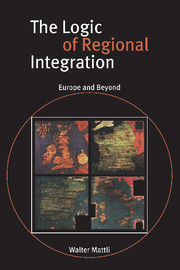5 - Integration outside Europe
Published online by Cambridge University Press: 06 July 2010
Summary
Introduction
In this chapter, the success or failure of various integration schemes outside the continent of Europe is discussed as a further test of the validity of the analytical framework elaborated in chapter 3. Section 2 takes up regional integration projects in Latin America in the 1960s and then in the wave of integration in the 1990s. The argument is made that these projects can be understood as examples of the “second integrative response.” The formation of the European Community was critical in triggering integration projects in the 1960s, while the recent deepening and enlargement of the European Union has been a key factor in triggering the latest wave of integration. Another external catalyst was the creation of the North American Free Trade Area in the early 1990s. All but one of the Latin American integration schemes of the first wave eventually failed. Two factors explain this outcome: lack of sustained demand for integration and failing regional leadership. The outcome of the latest wave is less certain. Latin America has changed in many ways since the 1960s. Most notably, the structure of the economies has changed. Industrialization has broadened the scope for mutually beneficial exchange at the regional level, giving rise to demand for regional institutional arrangements. However, weak leadership and an absence of “commitment mechanisms” have already derailed several integration objectives.
- Type
- Chapter
- Information
- The Logic of Regional IntegrationEurope and Beyond, pp. 139 - 188Publisher: Cambridge University PressPrint publication year: 1999



